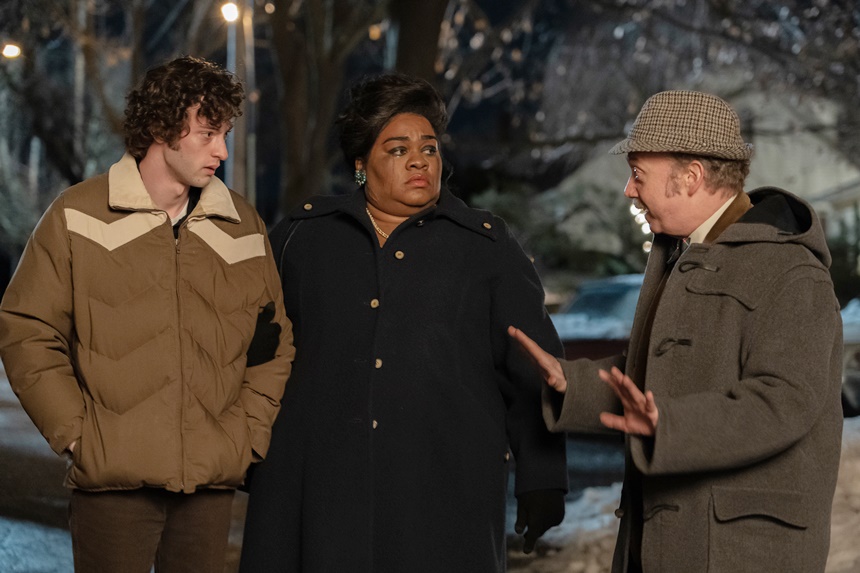Paul Giamatti recently won the Golden Globe for Best Performance by a Male Actor in a Motion Picture — Musical or Comedy for his work in The Holdovers, directed by Alexander Payne. In his acceptance speech he carved out a few moments to praise teachers, saying “…my whole family, they’re teachers. All of them going back generations. Teachers are good people — got to respect them. They do a good thing. It’s a tough job, so this is for teachers as well.” It was a fitting tribute, especially since the film has much to say about the core premise of great teaching: First and foremost, understand and respect students as fellow human beings.
The movie follows Giamatti’s character Paul Hunham, a teacher at a wealthy, private, all-boys boarding school in New England in 1970. Hunham has been forced to take on the unenviable task of staying at the school over Christmas break with the students who are not able to go home for the holidays for one reason or another (i.e. the “holdovers”). One of these students is Angus Tully (played by Dominic Sessa), an older teen whose mother and new stepfather have abandoned him so that they can go on a honeymoon. Tully is a student in Hunham’s ancient civilizations class, but each does not share a very high opinion of the other.
Due to an unforeseen turn of events, most of the holdovers end up going on a ski trip with another student at the last minute, leaving Hunham and Tully to hold down the fort. Mary Lamb (performed by Da’Vine Joy Randolph, in an award-winning turn), the head cook and a grieving mother, joins them as the only other person left at the school over the break. The three characters form a rather unexpected bond, and their friendship buoys them as they each take individual journeys of self-discovery: Lamb, to make peace with the loss of her son; Tully, to reconcile feelings of anger and sadness related to his family; and Hunham, to realize that teaching is about caring as much as it is about knowledge.
When the film opens, Hunham is a less than ideal teacher. Sure, he has an encyclopedic knowledge of Greek and Roman history, the subjects about which he frequently offers unsolicited mini-lectures, but he has a disdain for his students that is immediately apparent when he walks into his classroom. At best, Hunham treats the students as if they are an inconvenience, and at worst, as if they are beneath him and do not deserve their place in his class.
In one early scene, he returns exams to his students, and they discover that many of them have received Ds and Fs. They complain to him about the effect of these grades on their future, but instead of talking to them about how to improve before the next exam, he demeans them by explaining that he’s not surprised by this outcome because he has “had the misfortune of teaching them all semester.” One student who is particularly upset about his grade says, “I can’t fail,” to which Hunham cruelly responds, “Oh, don’t sell yourself short. I truly believe that you can.” Later he begrudgingly agrees to give them a make-up exam, pointing out that they can average the grades together from both exams, but he then rescinds this offer when Tully argues with him about the course schedule.
Uploaded to YouTube by Focus Features
Hunham treats his students this way because he believes, as he explains to the headmaster, that his job is to “instill basic academic discipline,” as if he were the scholarly equivalent of a drill sergeant. He is less concerned about learning, about their intellectual development, than he is with their ability to follow rules and maintain strict study habits. But the classroom is not the military, and meaningful teaching requires a different approach. The headmaster acknowledges this when he implores Hunham to “pretend to be a human being.”
Through his conversations and misadventures with Tully and Lamb during the holiday break, Hunham does more than take the headmaster’s snide advice. He begins to make sense of his past and to move beyond some of his most deeply held regrets, which allows him to develop empathy and compassion for both Lamb and Tully and, in particular, to understand the boy’s own need to figure out who he is and who he might become.
Toward the end of the film, the story returns Hunham to his classroom, where he has decided to give that make-up exam after all. Even some of his typical curmudgeonly comments to students are couched as jokes this time, a smile indicating that he is not serious and — perhaps — that he is even sorry about the way he has behaved in the past.
His final words to Tully are “You can do this,” and in them we see a genuine care for the teen that exemplifies Hunham’s turnaround. In the end, the impact Hunham has on Tully’s life has nothing to do with his expertise in history. Instead, it is rooted in the fact that he cares about his student as a learner and as a person. This is the foundation of great teaching. Students are not numbers or automatons. They are individuals who bring their hopes and fears and dreams with them into classrooms every day. Truly teaching them means to understand that they are each on their own journeys, to acknowledge that these journeys are difficult, and to help them reach their goals.
The Holdovers gives us a great gift by reminding us of this truth in such an eloquent way.
Become a Saturday Evening Post member and enjoy unlimited access. Subscribe now



